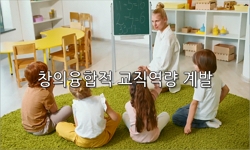The Purpose of this study was to examine the effects of a Jigsaw Cooperative Study, which is developed on children's self-esteem and learning social skills. Two research questions were made from the review of the literature, as follows; 1. Are there a...
http://chineseinput.net/에서 pinyin(병음)방식으로 중국어를 변환할 수 있습니다.
변환된 중국어를 복사하여 사용하시면 됩니다.
- 中文 을 입력하시려면 zhongwen을 입력하시고 space를누르시면됩니다.
- 北京 을 입력하시려면 beijing을 입력하시고 space를 누르시면 됩니다.
https://www.riss.kr/link?id=T9539874
- 저자
-
발행사항
부산 : 신라대학교 교육대학원, 2004
-
학위논문사항
학위논문(석사) -- 신라대학교 교육대학원 , 유아교육전공 , 2004. 8
-
발행연도
2004
-
작성언어
한국어
-
주제어
유아교육 ; 협동학습 ; 소그룹활동 ; 유아자존감 ; Jigsaw협동학습
-
KDC
375.1373.6 판사항(4)
-
발행국(도시)
부산
-
형태사항
ⅴ, 53장 : 도표 ; 26 cm.
- 소장기관
-
0
상세조회 -
0
다운로드
부가정보
다국어 초록 (Multilingual Abstract)
Two research questions were made from the review of the literature, as follows;
1. Are there any differences in self-esteem between children in an experimental and a control group?
2. Are there any differences in learning social skills between children in an experimental and a control group?
3. Are there any differences in self-esteem between
4. Are there any differences in learning social skills between
To answer the questions, sixty-four young children (64 five -year-old children) attending a preschool in Yang San participated in this study. They were randomly assigned to either an experimental or a control group. Children in the experimental group, took part in eight 30〜40 minute sessions of Jigsaw cooperative study program in a small group ; whereas, their counterparts in the same sessions of a traditional in a large group activity program. After the sessions of each program, all children were tested on the self-esteem test and the social skill test.
The children who took the Jigsaw cooperative study received higher achievement than their counterparts on self-esteem and social skills. From the results, it shows that the cooperative study is an effective teaching method to children's positive self-esteem and learning social skills. and there are no difference of self-esteem in their gender. but, there are differences children's social skills in a gender.
The Purpose of this study was to examine the effects of a Jigsaw Cooperative Study, which is developed on children's self-esteem and learning social skills.
Two research questions were made from the review of the literature, as follows;
1. Are there any differences in self-esteem between children in an experimental and a control group?
2. Are there any differences in learning social skills between children in an experimental and a control group?
3. Are there any differences in self-esteem between
4. Are there any differences in learning social skills between
To answer the questions, sixty-four young children (64 five -year-old children) attending a preschool in Yang San participated in this study. They were randomly assigned to either an experimental or a control group. Children in the experimental group, took part in eight 30〜40 minute sessions of Jigsaw cooperative study program in a small group ; whereas, their counterparts in the same sessions of a traditional in a large group activity program. After the sessions of each program, all children were tested on the self-esteem test and the social skill test.
The children who took the Jigsaw cooperative study received higher achievement than their counterparts on self-esteem and social skills. From the results, it shows that the cooperative study is an effective teaching method to children's positive self-esteem and learning social skills. and there are no difference of self-esteem in their gender. but, there are differences children's social skills in a gender.
목차 (Table of Contents)
- Ⅰ. 서론 1
- 1. 연구의 필요성 및 목적 1
- 2. 연구문제 5
- 3. 용어의 정의 5
- Ⅱ. 이론적 배경 7
- Ⅰ. 서론 1
- 1. 연구의 필요성 및 목적 1
- 2. 연구문제 5
- 3. 용어의 정의 5
- Ⅱ. 이론적 배경 7
- 1. 협동학습의 정의 7
- 2. 협동학습의 기본원리 9
- 3. 협동학습을 위한 역할 분담 11
- 4. 협동학습의 수업모형 13
- Ⅲ. 연구방법 19
- 1. 연구대상 19
- 2. 실험설계 19
- 3. 측정도구 20
- 4. 실험처치 프로그램 23
- 5. 연구절차 및 자료처리 25
- Ⅳ. 연구결과 28
- 1. 프로그램 유형에 따른 유아의 자아존중감 분석결과 28
- 2. 프로그램 유형에 따른 유아의 사회적 기술 습득 분석결과 35
- 3. 성별에 따른 유아의 자아존중감 분석결과 41
- 4. 성별에 따른 유아의 사회적 기술 분석결과 42
- Ⅴ. 결론 및 논의 44
- * 참고문헌 48
- * Abstract 52
- * 부 록 54












